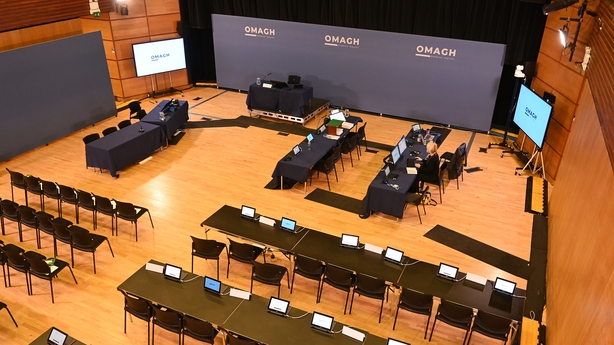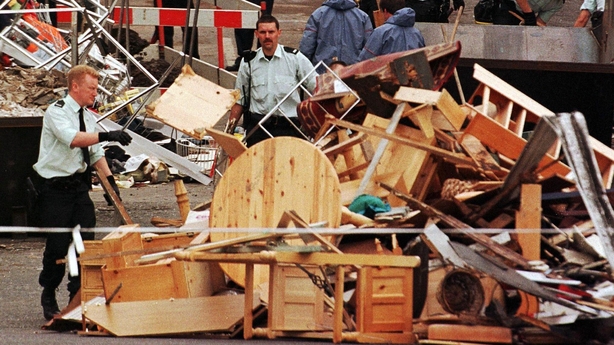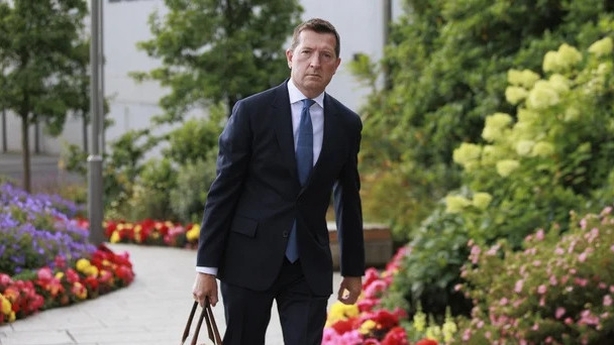After four weeks of heartbreaking testimony about the victims and from the survivors of the 1998 Omagh bombing, the final thing to be raised last week came under the banal heading of "Housekeeping".
It sounds dull, but the matters dealt with in those 20 minutes last Wednesday, go to the heart of the search for the truth.
How did a huge car bomb get through to kill 29 people, including a mother pregnant with twins, and seriously injured hundreds of others.
Two main issues were dealt with in the closing, and the Irish Government is at centre of one of them.
The Omagh Inquiry was established under UK law.

Its terms of reference set out its principal aim - to establish whether the atrocity "could have been prevented by UK state authorities".
Its power to compel witnesses and documents is limited to the UK's territory, including Northern Ireland.
But the families of the dead believe the full truth about Omagh will only emerge if they see sensitive documents held in Irish files and hear evidence from members of the Irish intelligence community.
And when you look at the facts of the bombing - that’s not hard to understand.
The bombers were in Northern Ireland for no more than an hour-and-a-half on 15 August 1998.
They crossed the border at Aughnacloy on the Monaghan/Tyrone border around 1.30pm for the half hour drive to Omagh.
They were only in the town long enough to park the device and for the driver and his accomplice to prime it before being picked up by the scout car.
They would have been back over the border 20 minutes before the bomb exploded at 3.10pm.
Read more: Omagh inquiry team expects deal with Irish Govt in March
In contrast the bombing was entirely conceived, planned and executed from the Republic of Ireland.
Several of those linked to the atrocity lived there, the bomb car was stolen in Carrickmacross, Co Monaghan, the device was assembled and loaded in the Republic and the bombers returned there.
And Omagh was not a one-off incident. There had been 30 dissident attacks in the months preceding it.
The intelligence services on both sides of the border would have been laser-focused on the activities of dissident republicans who were trying to wreck the Good Friday Agreement, which had been signed that Easter.
The Omagh families suspect there may be relevant information in garda and Army intelligence files about the bombing. Questions have been asked before about what was known.
The Irish Government has resisted calls for a parallel inquiry in the Republic, promising to facilitate and support the UK one instead. Taoiseach Micheál Martin described that as the "optimal" approach.
It has become a Programme for Government commitment.
Last July, a senior official from the Department of Foreign Affairs told a preliminary hearing of the Omagh Inquiry that the Irish State would enact new legislation if necessary to underpin full cooperation.
"Our commitment is to ensure that there is nothing left unanswered in our jurisdiction at the end of this inquiry," he said.
It was a complex area, he said. Any arrangement would have to be robust, consistent with Irish law and other constitutional and international responsibilities.
On Wednesday Paul Greaney KC - counsel to the Omagh Inquiry - closed the commemorative hearings by setting out progress that had been made.
Again, a senior representative of the Department of Foreign Affairs was present.

Mr Greaney said, in meetings with Irish officials, that they had been drafting a Memorandum of Understanding on how Irish Government cooperation would work.
"Our belief, the inquiry’s team’s belief, is that the outstanding issues between the Inquiry and the Irish Government on a framework for disclosure have narrowed.
"Our current understanding is that the Irish officials intend for the memorandum to be signed in March, subject to the approval of their Government," he added.
The discussions had been focused on the "disclosure of potentially relevant Irish State materials" to the inquiry.
That characterisation of the negotiations caused the Omagh families, who had campaigned for this inquiry, to sit up.
They have not been involved in the discussions; it has been done at Irish Government official to inquiry official level.
Solicitor John Fox represents 14 of the Omagh families. He says having heard what was said, they fear that what’s being worked on "may not go far enough".
"Whilst we have allowed the Irish Government the space to see what they mean by full cooperation, as of this week, our insight into that now indicates that that may only deal with materials," Mr Fox said.
Documents were important, he said, but the context provided by witnesses who could speak to them was key too.
If the families felt that the arrangements didn’t address their concerns, they would consider their options.
"The families are certainly aware of their ability to consider whether they seek judicial review proceedings before the Dublin courts," he added.
The families want some kind of independent assessment of any material handed over to ensure it’s the totality of the relevant documentation in Irish intelligence files.
They also want some mechanism that would allow findings to be made against the Irish State if the documents were to demonstrate prior knowledge of the bombing or other failings.
At present that would not be possible because it's a UK inquiry focused on UK intelligence agencies.
Mr Fox accepts this is difficult legal territory engaging issues of sovereignty. The families believe the Irish Government wants to help, they just want it to be robust.
By mid-March they hope to have sight of the Memorandum of Understanding and be able to assess it.
"It’s not straightforward, particularly after the four weeks of commemorative hearings that everyone has witnessed - the sheer raw emotions that are there, 26 years after.
"I think everyone left those four weeks thinking that everyone should be doing all they can to ensure those families and the victims that are enduring that, get the full answers," Mr Fox said.
The second issue dealt with in the closing stages of last week's hearing shows how tied up this inquiry is with the shadowy world of intelligence.

It was around how the families will be represented when intelligence material is being considered by the inquiry.
In the coming weeks, inquiry chairman Alan Turnbull will hear submissions about whether "special advocates" should be appointed.
They are lawyers who will participate in closed hearings where questions of informers, their information, surveillance and other sensitive matters will be examined.
Their appointment was sought, unsuccessfully, in three previous UK public inquiries; into the poisoning in London of Russian dissident Alexander Litvinenko, the 2017 Manchester Arena bombing and a UK inquiry relating to the Iraq War.
They have never been appointed before in the course of a UK public inquiry.
Mr Turnbull will have to decide if they should be appointed for Omagh.
If they are, they can take instruction from families before they go into the closed hearings but can have no dealings with them once they have seen the intelligence documents.
The first families are likely to know about the broad direction of that top secret evidence is when Mr Turnbull publishes a final report.
Relatives know this inquiry is probably their last, best shot at the truth.
Expect them to keep the pressure on for the delivery of it ahead of the reconvening of the Omagh Inquiry in June.







